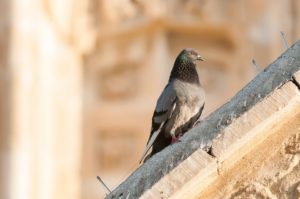Did you know that England is home to 18 million feral pigeons?
Meanwhile, in London alone, there is approximately one pigeon to every three people in the UK.
The pigeon population has grown out of control, and the bird is now largely considered a nuisance species that plagues urban areas.
With that in mind, what is the best pigeon deterrent?
Why do pigeons nest on properties?
Pigeons are naturally drawn to urban areas and to nest on properties for a number of reasons, starting with the most obvious; access to an abundance of food and water.
Most people will have seen that pigeons will feed on just about anything, whether that’s fruits, vegetables, seeds, and insects, as well as food dropped by people in urban areas.
While nesting on your property, pigeons enjoy easy access to food as well as water for drinking and bathing in, making them attractive nesting locations.
Unlike other bird species, pigeons are not well adapted to cold weather and, as a result, they will seek sheltered nesting sites when temperatures drop.
Urban properties are often an ideal space, with inviting nooks and crannies that can keep birds safe from the elements.
Properties with small spaces to nest also offer safety from predators like hawks, cats and other birds of prey.
Finally, despite being dubbed the ‘rats of the sky’, pigeons are often affectionate and social animals that nest in flocks.
If your property is large enough for multiple pigeons to nest together, you may find you have an even bigger problem.
What are the different types of pigeon deterrents?
Fortunately, there are a number of safe and harmless pigeon deterrents available, each with its own unique benefits and drawbacks.
Here we have listed some of the most commonly used pigeon deterrents:
- Bird spikes: These create a physical barrier that makes it difficult for pigeons to land or nest on your property. Spikes can be installed on sills, ledges and other surfaces where it is likely that pigeons will land.
- Netting: Bird netting is another popular and effective deterrent that can be installed to cover roofs, balconies and other spaces that need protection from pigeons.
- Audio devices: There is a range of audio deterrents, like ultrasonic devices, that emit high-pitched noises that can only be heard by pigeons nearby. This sound is unpleasant enough to scare them away from your property.
- Repellents: There are a number of different repellents on the market that help to deter pigeons. These generally contain ingredients that are unpleasant to pigeons, such as citronella and capsaicin.
- Habitat modifications: As mentioned, pigeons are attracted to spaces that provide access to food, water and shelter. So, by removing these provisions, you will make your property less appealing. This may include cleaning up the property, replacing open bins with closed lids, removing bird feeders, and repairing leaks.
- Falconry deterrent: Falcons and hawks are the natural predators for most pest birds, and pigeons are no exception. Falconry is one of the most effective methods of scaring pigeons away from an area and discouraging them from returning. As soon as they see the site is no longer safe, they will quickly disperse.
It is, however, important to note that pigeon deterrents are not always effective, and some pigeons will be resistant to them.
If this is the case, we always recommend employing the help of a professional pest bird control company that can best advise you on how to proceed.
Which is the best pigeon deterrent?
There is no best pigeon deterrent because the best solution is the one that will be most effective for your specific property and individual requirements.
These are some of the factors you should consider to help decide which is best:
- The size of the pigeon population
- The severity of the pigeon problem
- The cost of installing and maintaining the deterrent
- How easy will it be to install and maintain
- The environmental impact of the deterrent
Ultimately, the best pigeon deterrent will be different from place to place.
If you have a small group of pigeons, spikes, or even bird netting may be the best option and quickly resolve the problem.
However, if you have a larger population of pigeons that are causing damage and becoming a nuisance, you may need to use a combination of deterrents and employ the help of experts.
How to prevent pigeons from nesting in the future
Prevention is just as crucial as any deterrent, which is why to ensure the pigeons do not return, we would advise you to do the following:
- Remove access to any food sources that will appeal to pigeons, particularly food sources that can be consumed from the ground, such as pet food, open bins and even bird feeders
- Keep your property clean and regularly clear away any debris that could be used by pigeons to build nests. This includes fallen leaves, twigs, feathers, pet hair, and other loose material
- Install bird deterrents (netting, bird spikes and audio-visual deterrents)
- Get in touch with a professional pest bird control company
How Urban Hawks can help with pigeon deterrent
We have devised bird control solutions for commercial and domestic clients across the North West of England, and the UK more broadly, for quarter of a century.
Our highly trained team understands how to carefully manage the relationship between predator and prey in an urban environment to ensure any pigeon infestation is safely dealt with.
By implementing a tailored bird proofing solution together with falconry dispersal and disruption service, we have been able to resolve every type of pest bird issue at a range of locations, from shopping centres to supermarkets, waste disposal sites to stadiums.
If you have any questions, and want to learn more about our pest bird control services, don’t hesitate to contact us today on 0151 345 6854 or send an email to info@urbanhawks.co.uk

